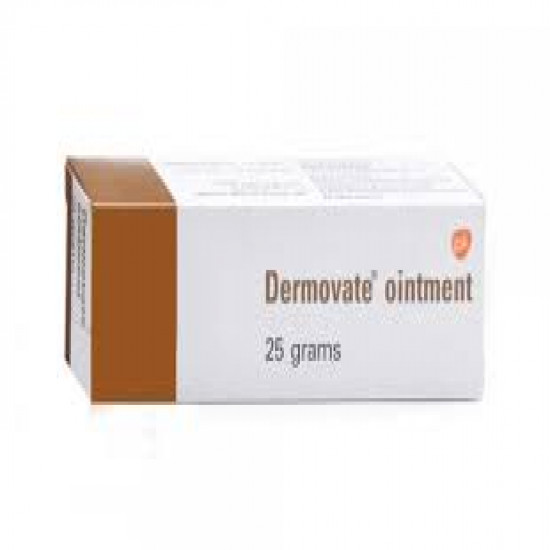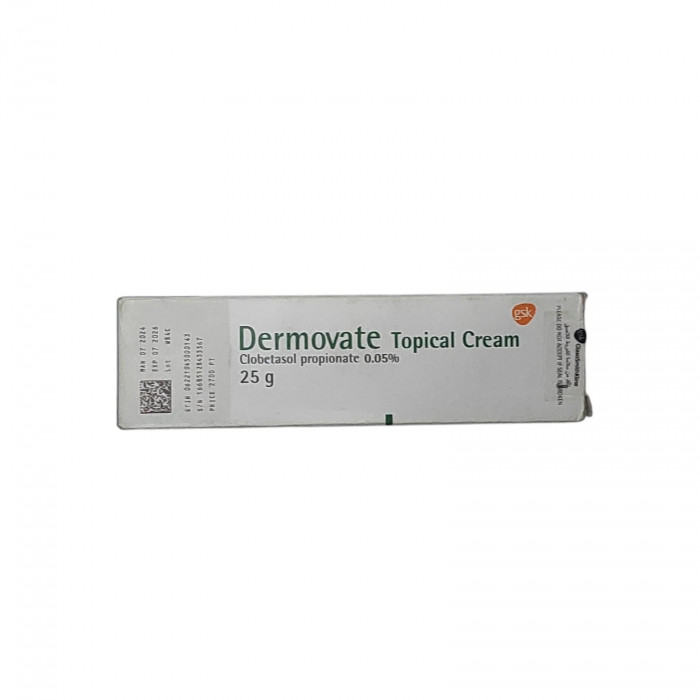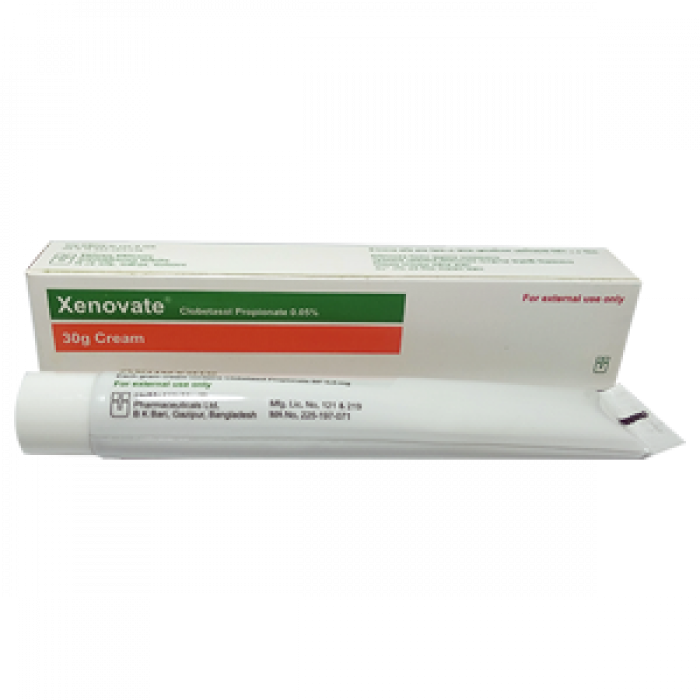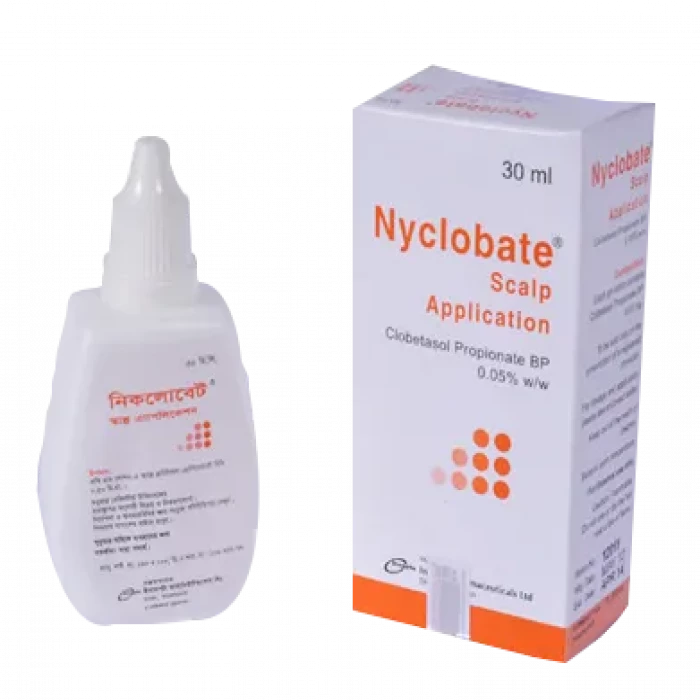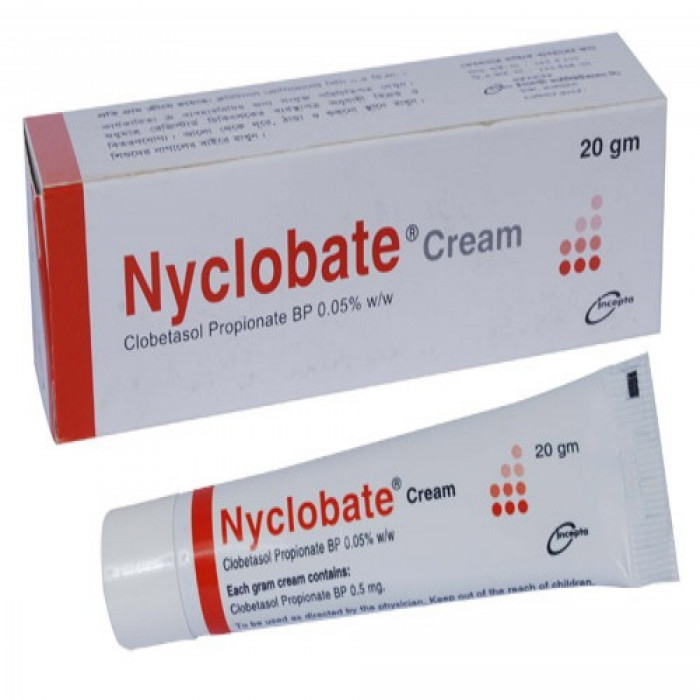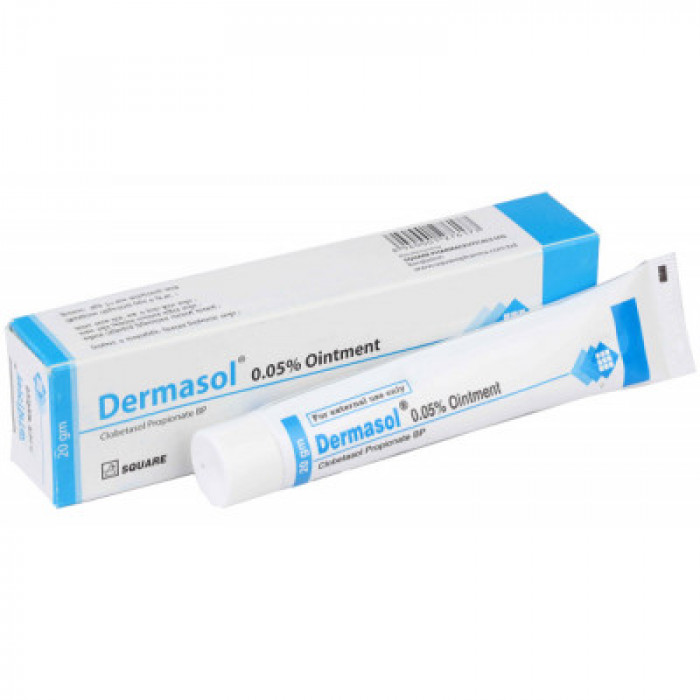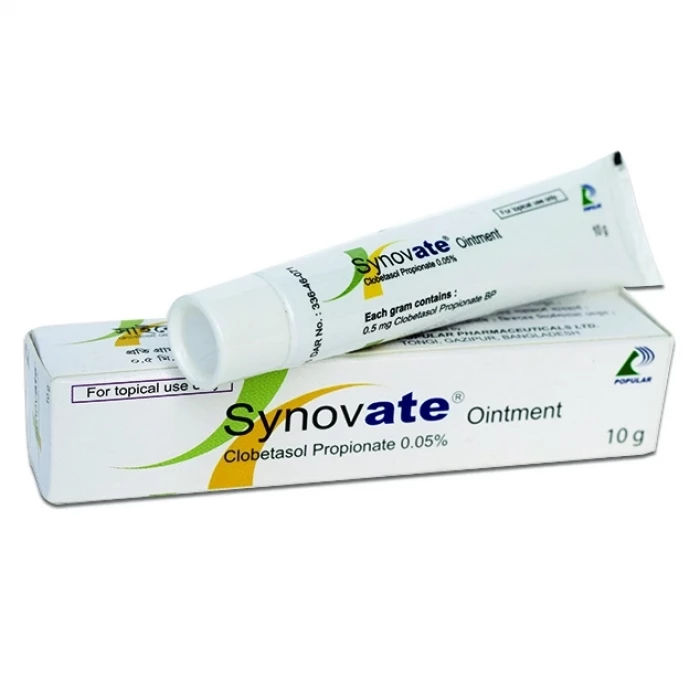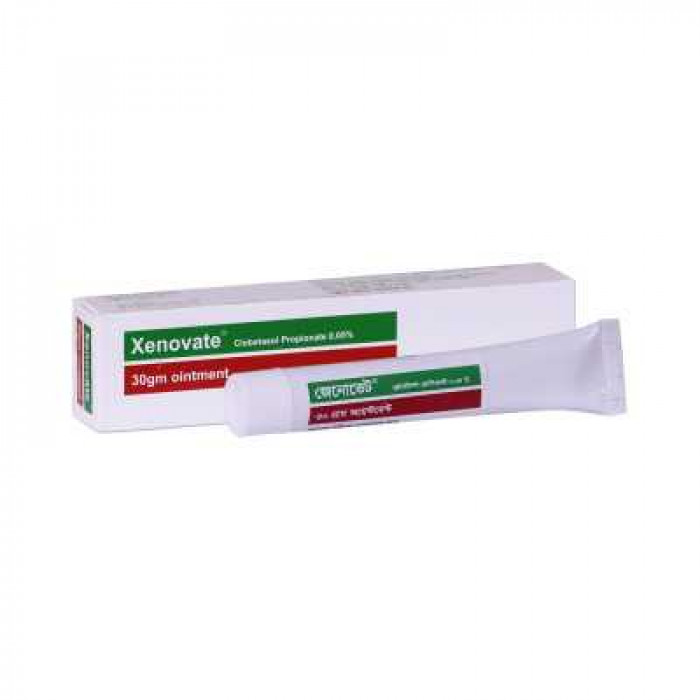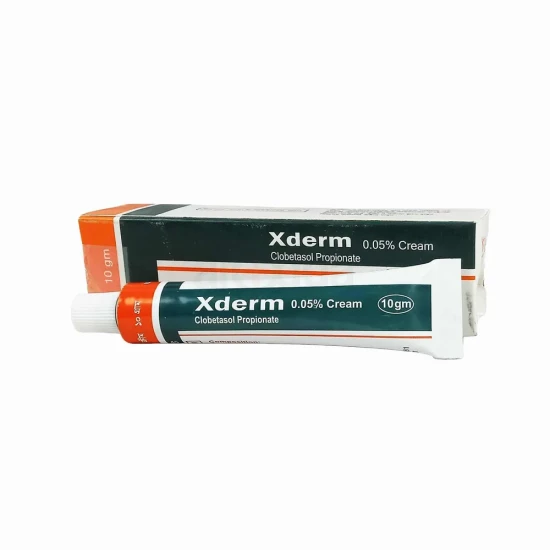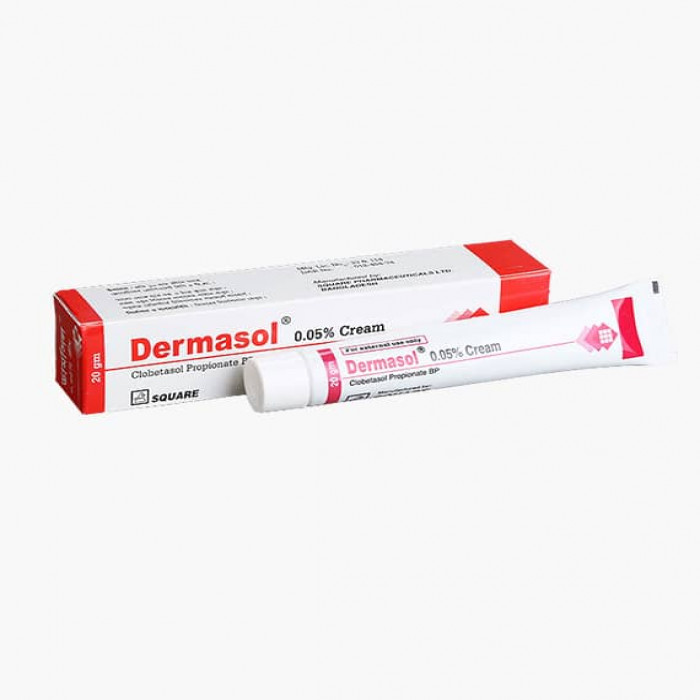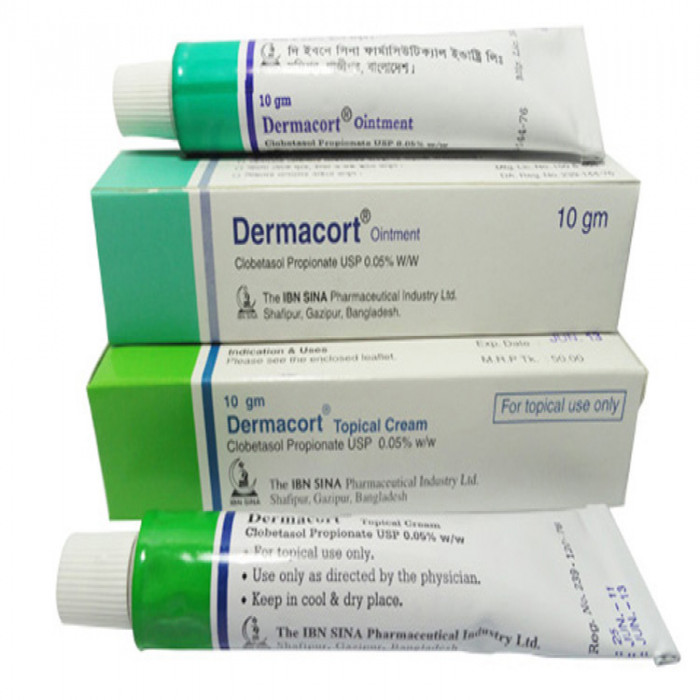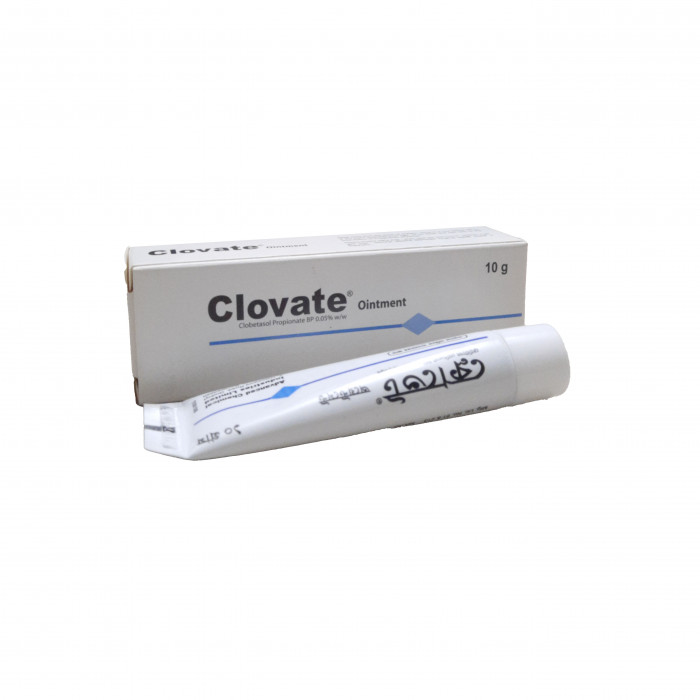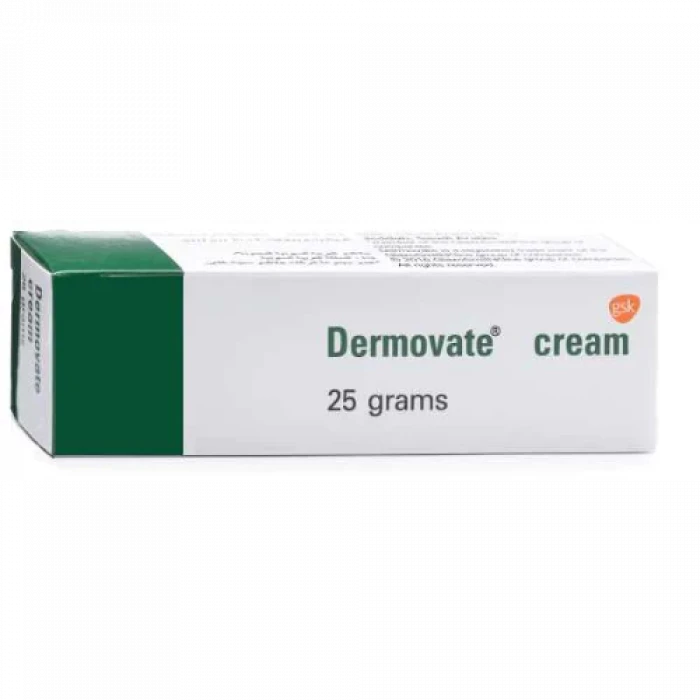
✔ 100% Authentic Product
👁️ Currently Viewing 8522
Dermovate 0.05% Cream 25gm
Clobetasol Propionate Cream is used in short courses to treat severe inflammatory skin disorders such as eczema, psoriasis, lichen planus, and discoid lupus erythematosus, particularly when milder corticosteroids have not been effective.
Discount
Price: ৳ 675
MRP:
৳
750
10%
Off

100% Genuine Products, Guaranteed

Safe & Secure Payments, Always

Fast, Secure & Efficient Delivery

Proper Packaging
 Cash on Delivery - All over Bangladesh
Cash on Delivery - All over Bangladesh Regular Delivery - 12-24 Hours, Dhaka City* Charge Tk.39-59
Regular Delivery - 12-24 Hours, Dhaka City* Charge Tk.39-59 Regular Delivery - 24-48 Hours, Other Cities* Charge Tk.99-110
Regular Delivery - 24-48 Hours, Other Cities* Charge Tk.99-110
 ফ্রি ডেলিভারিঃ - ৯৯৯ টাকা+ অর্ডারে, ঢাকা
শহরে
ফ্রি ডেলিভারিঃ - ৯৯৯ টাকা+ অর্ডারে, ঢাকা
শহরে ফ্রি ডেলিভারিঃ - ২৯৯৯ টাকা+ অর্ডারে, ঢাকার
বাহিরে
ফ্রি ডেলিভারিঃ - ২৯৯৯ টাকা+ অর্ডারে, ঢাকার
বাহিরে
100% Genuine Products, Guaranteed
Safe & Secure Payments, Always
Fast, Secure & Efficient Delivery
Proper Packaging
 Cash on Delivery - All over Bangladesh
Cash on Delivery - All over Bangladesh Regular Delivery - 12-24 Hours, Dhaka City* Charge Tk.39-59
Regular Delivery - 12-24 Hours, Dhaka City* Charge Tk.39-59 Regular Delivery - 24-48 Hours, Other Cities* Charge Tk.99-110
Regular Delivery - 24-48 Hours, Other Cities* Charge Tk.99-110 ফ্রি ডেলিভারিঃ - ৯৯৯ টাকা+ অর্ডারে, ঢাকা
শহরে
ফ্রি ডেলিভারিঃ - ৯৯৯ টাকা+ অর্ডারে, ঢাকা
শহরে ফ্রি ডেলিভারিঃ - ২৯৯৯ টাকা+ অর্ডারে, ঢাকার
বাহিরে
ফ্রি ডেলিভারিঃ - ২৯৯৯ টাকা+ অর্ডারে, ঢাকার
বাহিরে
✅ Description:
Dermovate 0.05% Cream is a topical corticosteroid medication used to treat various inflammatory and pruritic skin conditions. It contains the active ingredient Clobetasol propionate 0.05%, along with excipients like Glyceryl monostearate, Cetostearyl alcohol, Chlorocresol, Sodium citrate, Citric acid, purified water, Arlacel 165, Beeswax substitute 6621, and Propylene glycol.
Safety Advices

Alcohol
UNSAFE
There are no known interactions between Dermovate cream and alcohol, so it is generally safe to consume alcohol after using the cream.

Pregnancy
CONSULT YOUR DOCTOR
The use of Dermovate cream during pregnancy should be approached with caution due to the lack of available information on its safety. Topical steroids, including Dermovate cream, have the potential to be absorbed into the bloodstream and may pose a risk of fetal abnormalities if absorbed in significant amounts. Therefore, it should only be used during pregnancy if the benefits to the mother outweigh the potential risks to the fetus. Additionally, it should be used for the shortest duration possible and at the lowest effective dosage.

Breastfeeding
CONSULT YOUR DOCTOR
Regarding breastfeeding, there is also limited information available on the safety of Dermovate cream in lactating women. As with pregnancy, the decision to use Dermovate cream while breastfeeding should be made carefully, considering the potential benefits to the mother and the potential risks to the infant. It is advisable to avoid applying the cream near the breast area to prevent accidental ingestion by the breastfed baby.

Driving
SAFE
Dermovate cream is unlikely to affect one's ability to drive. However, if any discomfort or adverse effects occur after application that may impair driving ability, it is recommended to avoid driving until the effects subside.

Kidney
CONSULT YOUR DOCTOR
Clobetasol propionate, the active ingredient in Dermovate cream, is considered safe for use in individuals with kidney disease

Liver
CONSULT YOUR DOCTOR
Clobetasol propionate, the active ingredient in Dermovate cream, is considered safe for use in individuals with kidney disease
✔️ Uses of Dermovate 0.05% Cream
Treatment of skin conditions such as Psoriasis
✔️ How does Dermovate 0.05% Cream work?
The active ingredient in Dermovate cream is clobetasol propionate, which belongs to the class of medicines known as topical corticosteroids. Corticosteroids work by reducing inflammation in the skin. Inflammation can occur due to various reasons, including allergic reactions or skin irritation. When the immune system releases substances that widen blood vessels in the skin, it leads to redness, swelling, itchiness, and pain, as seen in conditions like dermatitis or eczema.
✔️ Side Effects of Dermovate 0.05% Cream
Side effects of Dermovate cream may include an increased risk of opportunistic infections, endocrine disorders (such as Cushing's syndrome), skin atrophy, stretch marks, thinning or wrinkling of the skin, dry skin, changes in skin pigmentation, and itching or local pain/burn.
✔️ Quick Suggestions:
- Clobetasol is used to treat redness, swelling, itching, and discomfort of various skin conditions.
- It should be applied to the affected areas as a thin film, two times daily, or as advised by your doctor.
- Do not use it more often or for longer than advised by your doctor.
- Do not cover the area being treated with airtight dressings such as bandages unless directed by a doctor, as this may increase the risk of side effects.
- If you think the area of skin you are treating has become infected you should stop using Clobetasol and consult your doctor.
- Consult your doctor if your skin condition has not improved after four weeks of treatment. Do not use it for more than 4 consecutive weeks at a time.
✔️ Indication of Dermovate 0.05% Cream
Dermovate cream is indicated for use in adults, the elderly, and children over 12 years old to relieve inflammatory and pruritic symptoms of steroid-responsive skin diseases, including psoriasis (except widespread plaques), intractable persistent dermatitis, flat lichen, discoid lupus erythematosus, and other skin diseases unresponsive to lower potency steroids.
✔️ Pharmacology
Dermovate cream acts as an anti-inflammatory agent by inhibiting late-phase allergic reactions, reducing mast cell density, chemotaxis, eosinophil activation, cytokine production, and arachidonic acid metabolism. It can be absorbed systemically through intact skin, and its metabolism and elimination processes are similar to systemic corticosteroids.
✔️ Dosage & Administration of Dermovate 0.05% Cream
For adults, the elderly, and children over 12 years old, a thin layer of Dermovate cream should be applied to the affected area 1-2 times daily for up to 4 weeks, then gradually reduced as symptoms improve. The maximum weekly dose should not exceed 50g. It should not be used on children under 12 years old unless directed by a doctor.
✔️ Interaction
Dermovate cream may interact with CYP3A4 inhibitors, potentially increasing systemic exposure to corticosteroids. It should be used with caution in pregnant or breastfeeding women, and only if the potential benefit justifies the potential risk to the fetus or infant.
✔️ Contraindications
Dermovate cream should not be used in cases of untreated skin infections, rosacea, acne, itching without inflammation, itching around the anus and genital area, inflammation of the skin around the mouth, hypersensitivity to the cream, viral or fungal infections, extensive plaque psoriasis, or in children under 12 years old.
✔️ Pregnancy & Lactation
Clobetasol Propionate should be used in pregnant women only if clinically needed, and the benefits outweigh the risks. If you are pregnant, please consult your doctor before using Clobetasol Propionate.
It should be used in breastfeeding mothers only if the benefits outweigh the risks. If you are breastfeeding, consult your doctor before using Clobetasol Propionate. Take care that the medicine should not come in contact with your infant.
✔️ Precautions & Warnings
Patients with a history of local allergy or hypersensitivity to corticosteroids should use Dermovate cream with caution. Cushing's syndrome, secondary to elevated cortisol levels, may occur, especially with increased absorption of topical steroids. Special care should be taken in certain populations, such as children, the elderly, and those with hepatic or renal impairment.
✔️ Storage Conditions:
- Dermovate cream should be stored at room temperature, away from sunlight and moist areas.
- Keep it away from children and pets.
⚠️Disclaimer:
At ePharma, we’re committed to providing accurate and accessible health information. However, all content is intended for informational purposes only and should not replace medical advice from a qualified physician. Please consult your healthcare provider for personalized guidance. We aim to support, not substitute, the doctor-patient relationship.




